
World
16:11, 19-Apr-2019
One year in post-Castro Cuba: A new constitution, internet and protests
By Sim Sim Wissgott
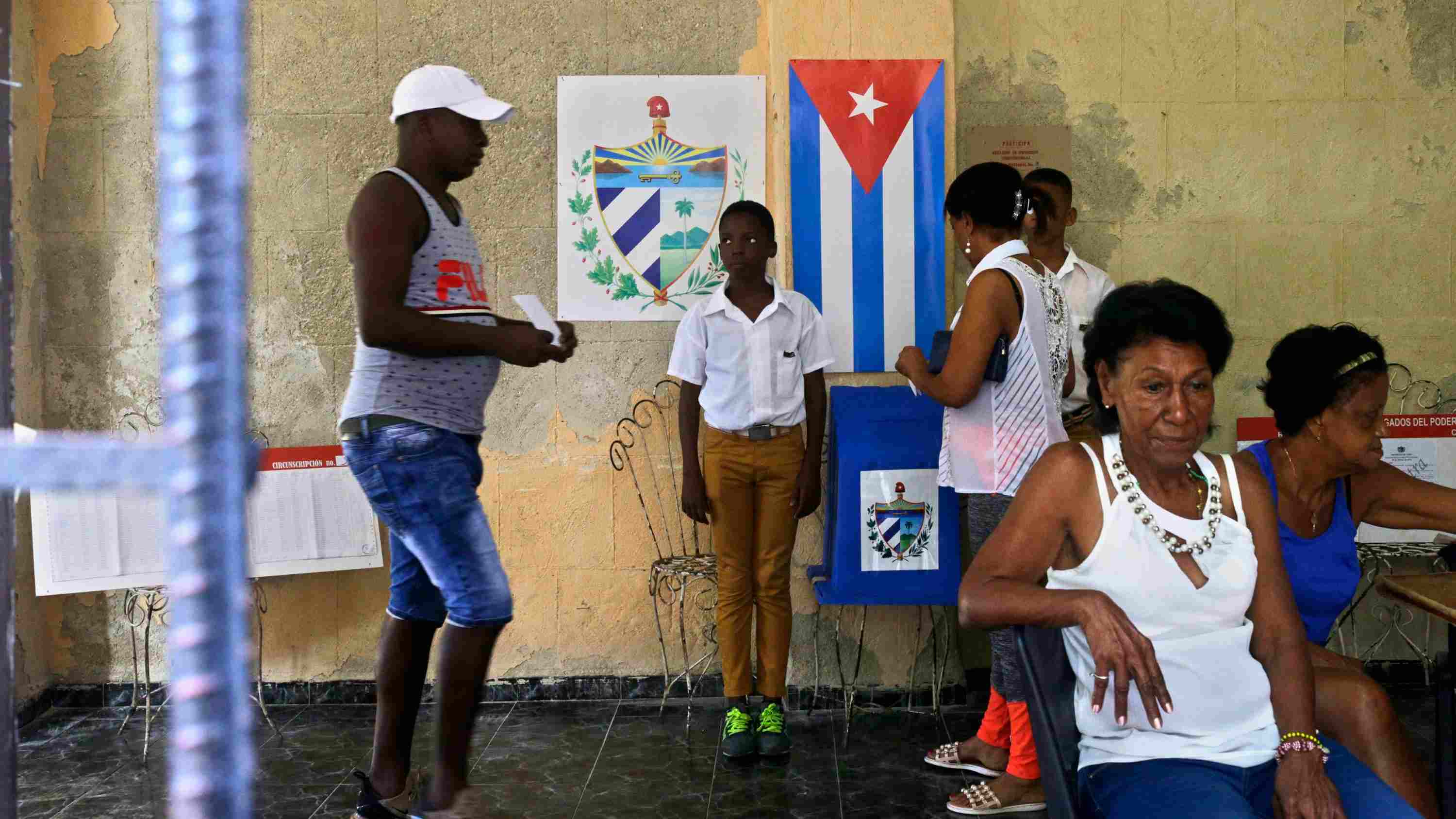
It's been a year since Miguel Diaz-Canel was sworn in as president of Cuba on April 19, 2018, ending almost 60 years of "Castro rule" by the brothers Fidel and Raul.
What changes has this year brought to the island? Here is a brief overview.
A new constitution
In July, a new draft constitution was approved by the National Assembly. It was put to a referendum in February and came into effect earlier this month.
Among its main provisions, the new basic law restores the post of prime minister and imposes a two-term limit on the president.
It also recognizes private property, foreign investment and market economics, bans discrimination on the basis of sexual orientation, removes the definition of marriage as a union between a man and a woman – potentially paving the way for legalizing gay marriage – and enshrines the right to legal counsel upon arrest.
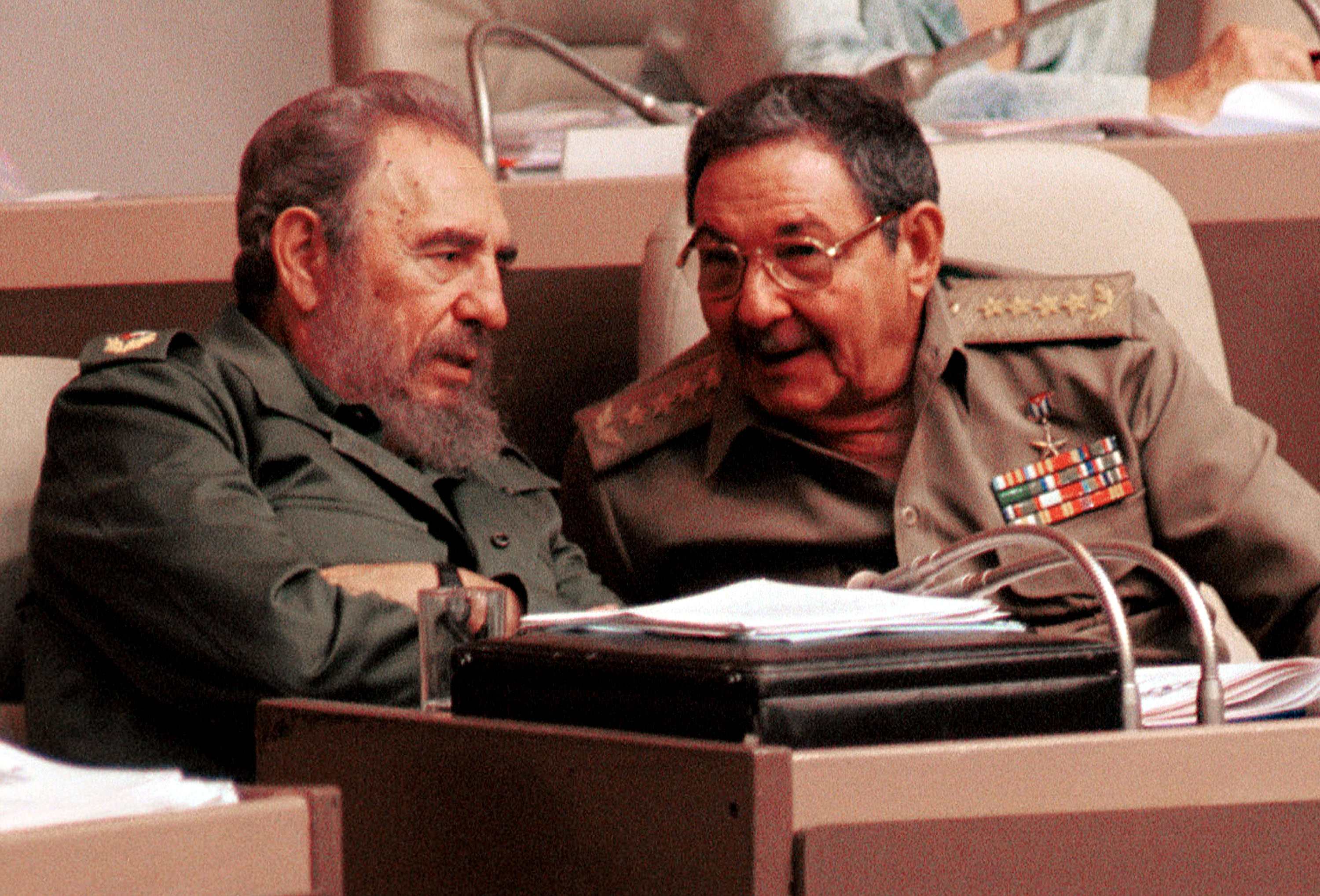
Fidel Castro (L) and his brother Raul Castro (R) speak during a session of the National Assembly legislature in Havana, Cuba, August 3, 2001. /Getty Images
Fidel Castro (L) and his brother Raul Castro (R) speak during a session of the National Assembly legislature in Havana, Cuba, August 3, 2001. /Getty Images
Many have complained the text does not go far enough, but the changes are "an important symbolic step," William LeoGrande, a Cuba expert at American University told Bloomberg. "The new constitution underscores the recognition that a mixed economy is the future."
The draft law also sparked a rare public debate. Churches came out firmly against it and a popular consultation resulted in numerous changes to the draft text.
The constitution was overwhelmingly approved in the February referendum, but over 700,000 Cubans – or nine percent of voters – rejected it in what some described as an "unprecedented display of ballot-box dissent" on the island.
Internet access
One of the most isolated countries in the world for long, Cuba rolled out 3G mobile internet across the island for the first time in December.
Critics noted that the cost of access under the scheme – operated by state telecommunications company ETECSA – remained high for many Cubans.
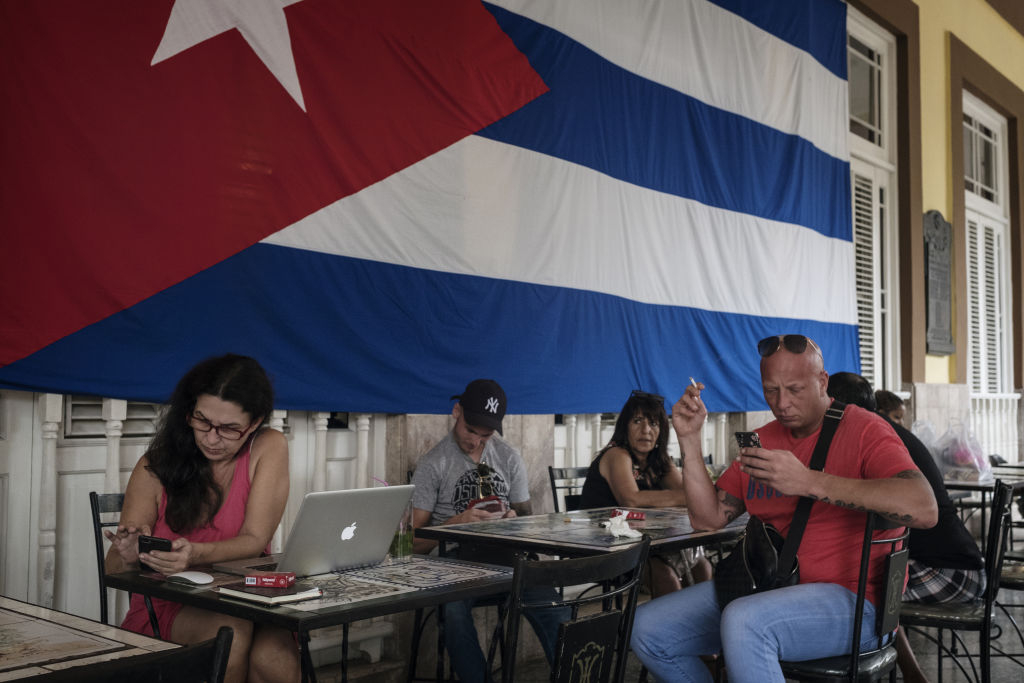
People use mobile devices at a Wifi hotspot at Hotel Inglaterra in Havana, Cuba, January 29, 2018. /Getty Images
People use mobile devices at a Wifi hotspot at Hotel Inglaterra in Havana, Cuba, January 29, 2018. /Getty Images
Still, the roll-out was greeted as a milestone: until 2013, internet access was only available in tourist hotels and some other establishments. Since then, public Wifi hotspots and cybercafes have mushroomed, backed by the government, and efforts are underway to connect homes.
Illustrating this desire to join the digital age, the 58-year-old Diaz-Canel – Cuba's first leader born after the Revolution – launched a Twitter account in August and actively posts on it. Other government officials have followed suit and the presidency also has a YouTube channel.
"We cannot ignore the networks where there is an ideological battle going on," Diaz-Canel told politicians in December.
Civil protests – online and in the streets
In early April, hundreds of Cubans took part in an animal rights march that foreign observers hailed as the first independent demonstration ever allowed by the state.
In the past, only protests by groups affiliated with the state or the ruling Communist Party have been permitted.
Organizers said it was an "unprecedented" move and could signal a "new Cuba."
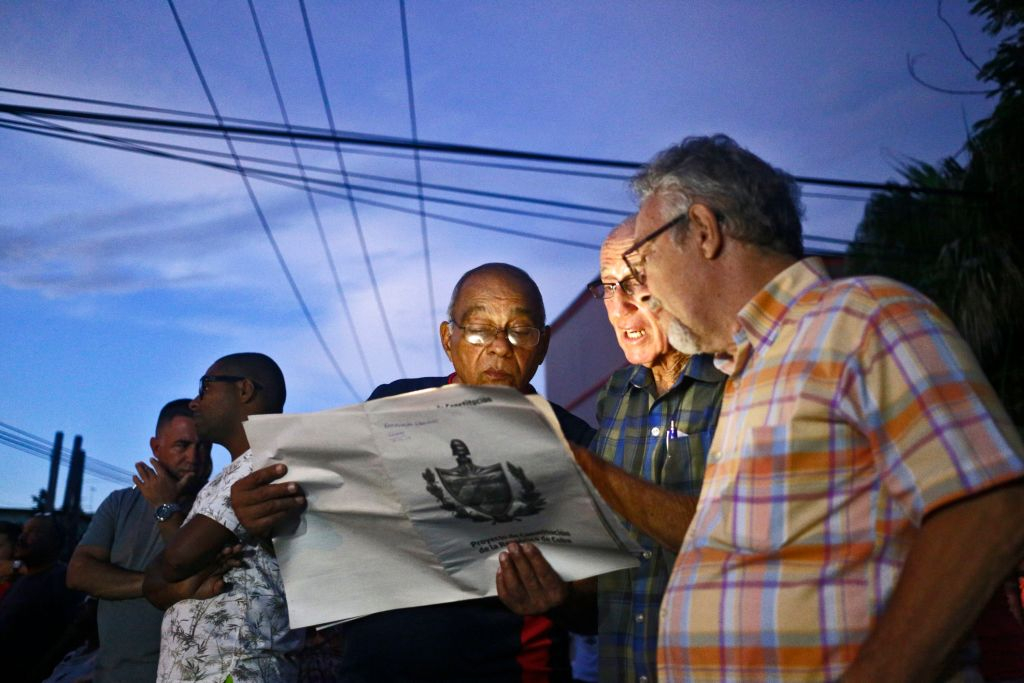
Citizens study a draft of the constitution at a public debate in Havana, Cuba, August 13, 2018. /Getty Images
Citizens study a draft of the constitution at a public debate in Havana, Cuba, August 13, 2018. /Getty Images
Broader access to the Internet has also allowed civil society to mobilize online and groups have had some success pushing back against proposed restrictions on the arts and the private sector. "No" campaigners were also vocal online ahead of the constitutional referendum.
"Civil society (is) awakening," Richard E. Feinberg, a senior fellow at the Brookings Institution noted in December, although it remains to be seen whether this will carry over to other issues.
In other news…
Other developments over the past year have been initiated abroad or been the result of measures that began before Diaz-Canel's arrival in office.
The island notched up a new record of 4.75 million visitors in 2018 as tourism on the island continues to grow, despite new travel restrictions imposed by the U.S..
In August, Cuba's Official Gazette announced that foreign operators would be allowed to run the island's railways for the first time since they were nationalized during the 1959 Revolution.
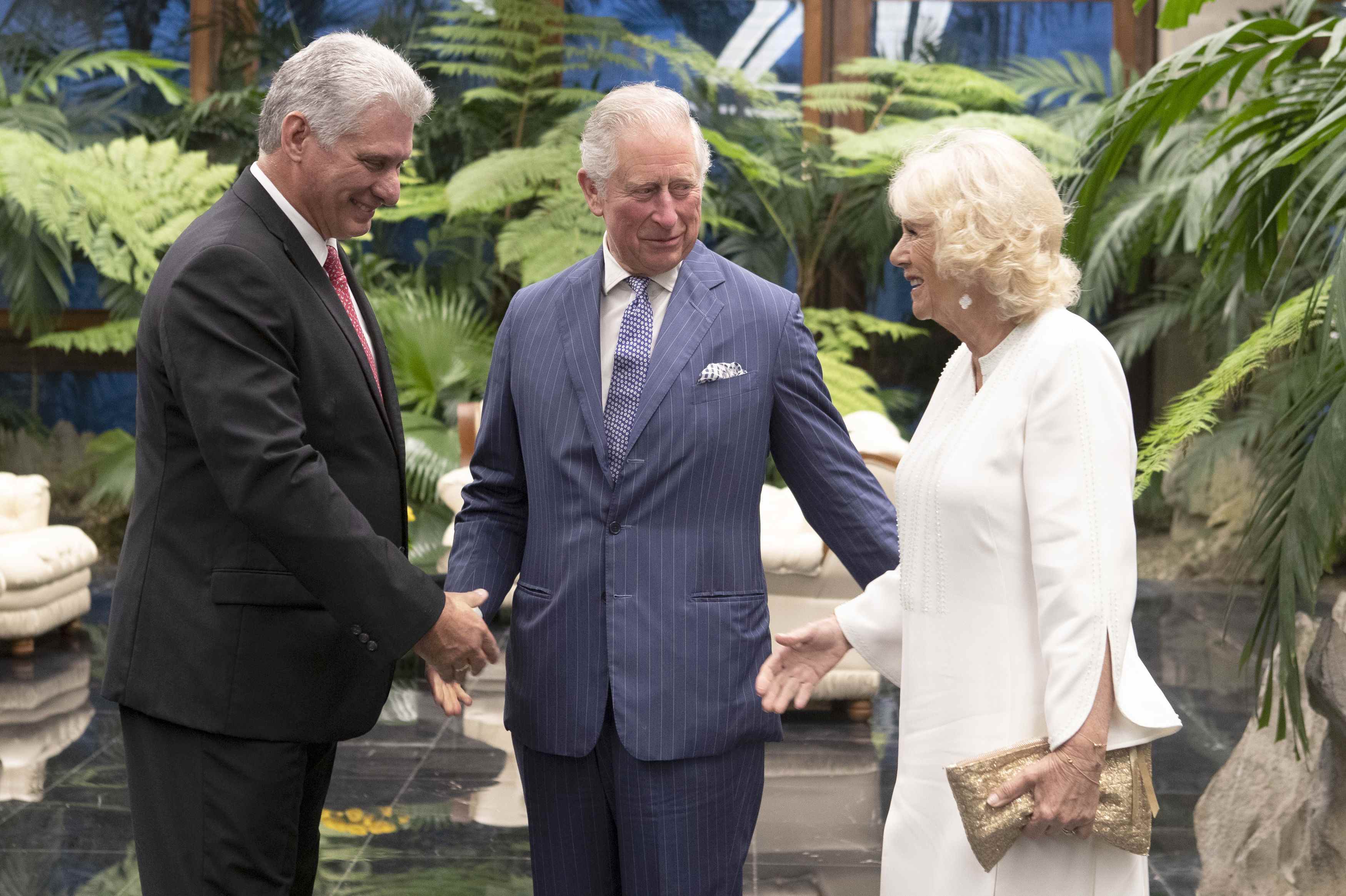
Cuba's President Miguel Diaz-Canel greets Britain's Prince Charles and his wife Camilla in Havana, Cuba, March 25, 2019. /Getty Images
Cuba's President Miguel Diaz-Canel greets Britain's Prince Charles and his wife Camilla in Havana, Cuba, March 25, 2019. /Getty Images
And earlier this year, Britain's Prince Charles and his wife Camilla became the first British royals to visit post-revolutionary Cuba, in what diplomats described as a "fresh willingness by the UK to engage."
'We are continuity'
In just a year, Diaz-Canel has overseen some high-profile changes to Cuban society.
Not all have been well received, and the jury is still out on whether certain developments are here to stay or will be reversed in the future.
The economy is also struggling, U.S. sanctions on Venezuela have squeezed crucial oil supplies, and Washington has been piling the pressure on Havana.
Upon taking office, Diaz-Canel made clear that Raul Castro, who is still the leader of the Communist Party of Cuba, would continue to "lead the decisions about the future of the country."
Diaz-Canel has repeatedly emphasized continuity from the Castro era – his tweets often contain the hashtag #SomosContinuidad, meaning "we are continuity."
Nevertheless, observers have also welcomed a more open style of leadership from the new president.
(Cover picture: Cubans vote in a referendum on the new constitution in Havana, Cuba, February 24, 2019. /Getty Images)

SITEMAP
Copyright © 2018 CGTN. Beijing ICP prepared NO.16065310-3
Copyright © 2018 CGTN. Beijing ICP prepared NO.16065310-3